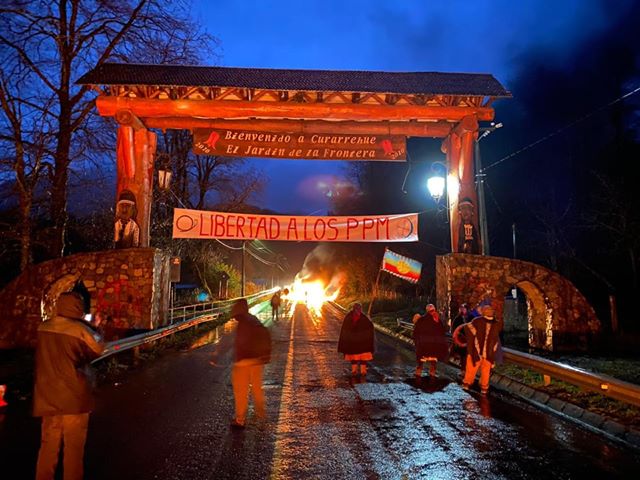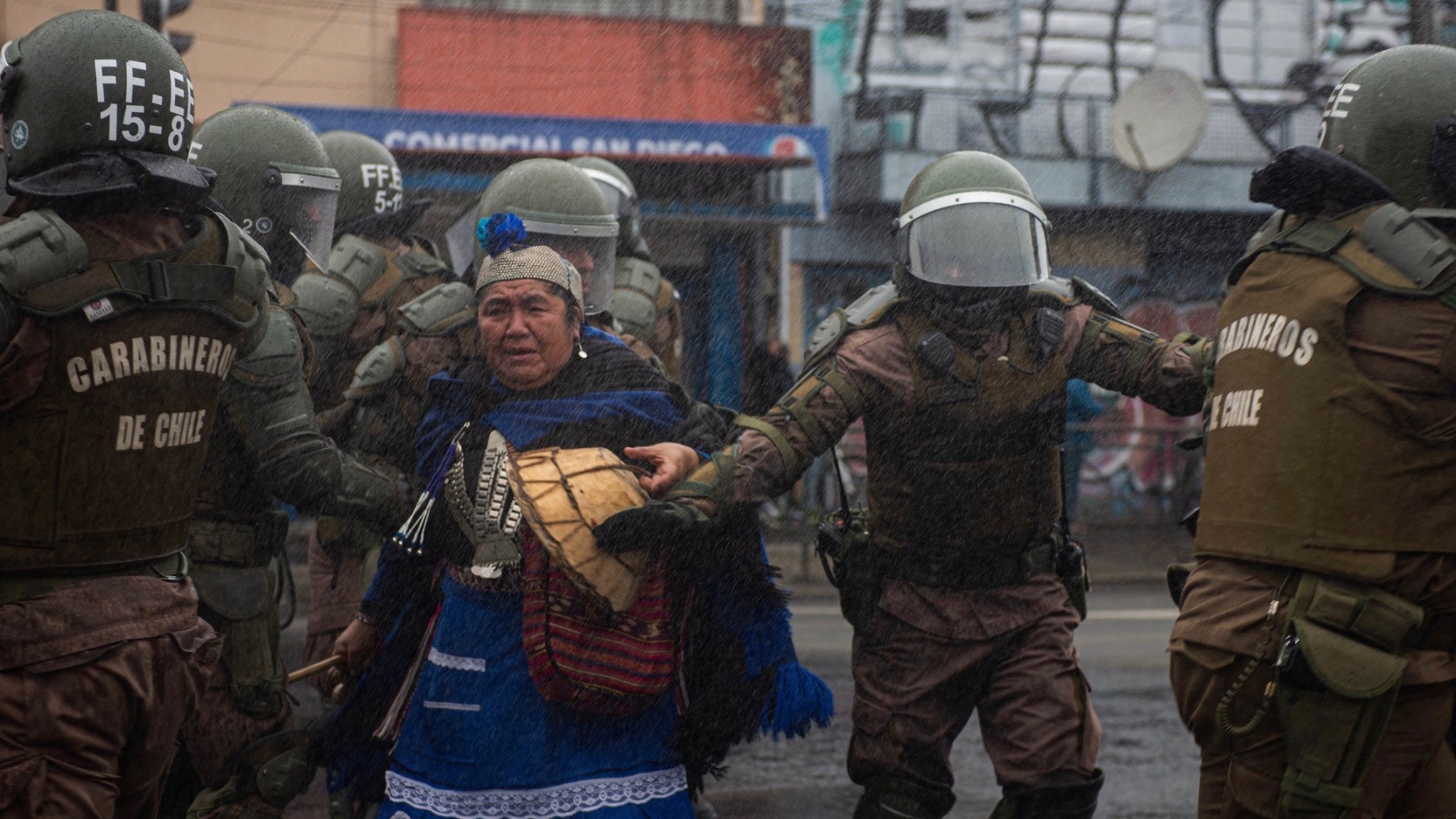On the night of August 1, groups of right-wing extremists, armed with sticks and stones, violently attacked the members of the Mapuche community, who had occupied four mayoral offices in the Malleco province of Chile’s Araucania region since last week. The members of Indigenous community took over the municipal government offices as a measure of protest to demand the release of several Mapuche political prisoners, who have been on hunger strike for the last 3 months.
Shouting insults and racist slurs, the violent civilian groups beat Mapuche Indigenous people and forcefully evicted them from the government facilities in the municipalities of Curacautín, Ercilla, Traiguén and Victoria. The mob also burned down the wooden Mapuche statue, Chemamüll, located in the Plaza de Armas Victoria, Victoria municipality.
The violent actions were coordinated by Araucania’s far-right group, Association for Peace and Reconciliation of Araucanía (APRA). Local media released an audio message shared on Twitter, in which Gloria Naveillán, spokesperson for APRA, calls on the people to act against the Mapuche community members in the municipality of Victoria. “How many are raising their hands to join us tonight in the Plaza? Bring sticks and everything you need to defend yourselves,” Naveillán said in the message.
Witnesses and victims allege that the violent incidents took place in complicity with the Chilean national police, the Carabineros. According to various complaints from residents, Carabineros officers, stationed in the province, did nothing to stop the armed civilians from attacking Mapuche community members.
Additionally, around 40 Mapuches, including minors, who were beaten by the violent civilian group, were arrested for public-order crime after the eviction. Meanwhile, not one aggressor has been arrested despite video evidence circulating on social media.
National and international condemnation of the racial violence
The following day, on August 2, numerous social movements and human rights organizations across the world denounced the violent racist and fascist acts and rejected the detention of Mapuche protesters.
They questioned the abilities and intentions of the Carabineros, who had omitted to act, allowing armed civilians to attack other civilians during the curfew hours in place due to the COVID-19 pandemic. The organizations demanded that urgent investigative and judicial actions be taken against the Carabineros. They also demanded the resignation of the newly appointed Minister of the Interior, Víctor Pérez, whom they accused of adopting violent and illegal measures instead of dialogue to resolve the conflict. Movements have also called on citizens to unite against the structural and racial violence against the Mapuche people and to mobilize demanding an end to the oppression against them.
Demonstrations were held in Araucania over the past week in solidarity with the Mapuche people, against the violent episodes that occurred last weekend and in demand for the release of Mapuche political prisoners. Incidents of police repression were registered in the towns of Lumaco and Temuco.

The Observatory of Human Rights and Police Violence also denounced the violence by armed civilian gangs and demanded respect for the rights of the Mapuche community. “Government authorities must cease mistreatment of Mapuche communities and ensure that public policies are put in place that unrestrictedly respect human rights. We call on Minister Pérez to not encourage that groups of armed and violent civilians act outside the current legal system to intervene in a conflict that is the responsibility of the State of Chile to put an end to,” stressed the entity in a statement issued on August 2.
On August 3, the Progressive Women’s Front ‘Tati Allende’, the National Coordinator of Human Rights Organizations, the Association of Relatives of Disappeared Detainees (AFDD), the Association of Relatives of Executed Political Prisoners (AFEP), among other organizations, released a statement condemning the actions of armed civilians and security forces and demanded that the government of President Sebastián Piñera immediately remove Pérez from his position.
The National Institute of Human Rights (INDH) in Chile, on August 4, issued a statement rejecting the attacks on Mapuche Indigenous people. The INDH regretted that groups of civilians decided to carry out eviction actions that are only the responsibility of the government authorities. The organization called for a proper investigation and demanded that those responsible be brought to justice. The institute also urged the national government to take all measures to eliminate racial discrimination.
The Chilean legislators also condemned the acts of violence against the Mapuche people and questioned the actions of the government authorities. On August 4, the Chamber of Deputies began the process of setting up an investigative commission to find the truth behind the lamentable events and the national police’s doubtful actions. The same day, in the Senate, a special session was held to analyze the serious issue.
On August 4, Jan Jarab, the regional representative of the United Nations High Commissioner for Human Rights (UNHCHR), also expressed concern about the recent expressions of hatred and racial discrimination against the Mapuche people. Jarab urged to find solutions to the ongoing social tensions through dialogue. He also called for a prompt, independent, and thorough investigation of the facts. Jarab also communicated his concerns about the health of Mapuche political prisoners, who are currently on a hunger strike.

Mapuche political prisoners on hunger strike
Since May 4, nine Mapuche political prisoners, including Mapuche spiritual leader (Machi) Celestino Córdova, have been carrying out a liquid hunger strike in Angol prison to demand compliance with the Convention 169 of the ILO, which recognizes Indigenous people and their rights.
Córdova denounced the discrimination and harassment faced by Mapuche prisoners in the Angol prison. He denounced that the requests for early release and parole of the Mapuche prisoners, despite having met the necessary requirements to qualify, had been rejected.
In the face of injustice, Córdova began the hunger strike to demand that the rights of Mapuche political prisoners be respected. And to demand that they be treated like other prisoners and be granted humanitarian release following the recommendations of the international organizations like the UN and the Inter-American Commission on Human Rights (IACHR) to protect the life of incarcerated populations from the danger of the COVID-19 pandemic.
Recently, on August 2, the spokesperson for Mapuche inmates in the Temuco prison, Juan Pichun, denounced that the Araucania authorities keep Mapuche political prisoners under unequal conditions and are indifferent to the prisoners on hunger strike.
After three months of strike, Córdova is in a delicate state of health. He has lost more than 20 kilograms of weight and suffers from permanent bradycardia and hypotension. He is confined in the Intercultural Hospital of Nueva Imperial in the Araucania region.
Given the government’s indifference to Cordova’s deteriorating health and Mapuche inmates’ claims, on July 20, seven other prisoners in the Temuco prison began a hunger strike in their support. Earlier, on July 6, eleven inmates from Lebu prison joined their spiritual leader in his protest action.
Since July 28, members of the Mapuche community have been mobilizing in different parts of the Araucania region in support of their imprisoned family members and friends, demanding their freedom. In addition, they are demanding respect for their claims for ancestral territories and a dialogue table with the government to find solutions and reach a political agreement to the historic conflict between the Mapuche community and the Chilean state.





